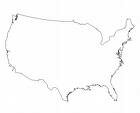Observing US: A column about America, by Marylaine Block originally published by Fox News Online, 1998-2000 |
 |
Observing US: A column about America, by Marylaine Block originally published by Fox News Online, 1998-2000 |
 |
#104, September 12, 2000
A TAXING ISSUE
by Marylaine BlockWhenever it is suggested that Internet businesses should pay state and local taxes like any other business, there is an immediate outcry about greedy governments killing the burgeoning new Internet economy because they can't resist any opportunity for new taxes.The phrase should not be "greedy governments," though, but "bleeding governments." Sales taxes are hardly new - they are merely taxes current law allows Internet commerce to evade. That means state and local governments have less revenue coming in, and two choices about what to do about it: reduce services, or raise taxes to make up the difference. If they raise sales taxes, small businesses will be in the unhappy position of subsidizing the very Internet businesses that endanger their existence.
You see, small businesses are already in danger, simply because they ARE small. They don't have high volume sales that allow them to negotiate sweetheart deals with suppliers. Even before Amazon came along, small independent bookstores started closing all over the country, unable to compete with Borders and Barnes and Noble. It's been shown in Iowa that within five years after a Wal-Mart store is built, most nearby clothing stores and hardware stores have gone out of business. If Wal-Mart closes a store that's not making enough money, those nearby communities are then left with no place to buy basic goods.
For small business, this kind of competition is bad enough. Having to compete with Internet commerce is just one more nail in the coffin.
Small businesses have other kinds of fixed costs that Internet businesses don't have to deal with -- providing customer parking, security, and clean, attractive premises. They have to pay property taxes, and stretch their small staffs to accommodate the longer hours customers now expect. They also pay substantial good will costs, sponsoring little league teams, contributing to United Way, and working with the local Chamber of Commerce. In short, they spend both time and money to make their towns better places to live.
That's why small businesses matter. Concentrated together, they form the heart of any community, giving people a place where they can not only buy necessities but also bump into each other, chat, exchange news, and talk politics. They give young people a place to see and be seen, to run into each other accidentally on purpose, to flirt and court. When city fathers build parks and libraries and city halls around their small businesses, they turn a collection of buildings into a town, and bond individuals into a community.
A town's ecology is fragile, though. It takes a critical mass of businesses to draw people downtown. When one business fails, its gaping empty storefront endangers the rest. That's why many communities have fought to keep Wal-Marts and other "big box" stores from locating nearby.
Internet stores are just another kind of unfair competition, and at the moment, not even a major one. But why should we give them an extra edge on local businesses by giving them a free ride on taxes? We're not talking about imposing outrageous new taxes, we're talking about taking away an inadvertent, unintended government subsidy that may have devastating side-effects.
We need to think about the kind of world we want. If we want to live where the only surviving local businesses are convenience stores, gas stations, and restaurants (the businesses that offer the kinds of immediate gratification and service that the Internet can't provide) by all means, let's keep on subsidizing Internet commerce.
But if we want towns with thriving business districts, local governments that can afford to provide parks, museums, and libraries, and local business owners who sponsor carnivals and parades and a Haunted House for the kids at Halloween, we should make Internet commerce pay its fair share.
Maybe local small business is doomed anyway. Maybe we've decided that price is all that matters, and that the Big Box stores and Internet businesses, with their huge inventory and deep discounts, are what we prefer. But if that business model is going to win, we should at least insist that it win on a level playing field.
Read the rest of
these columns
HEREMarylaine.com
home to all my
other writing